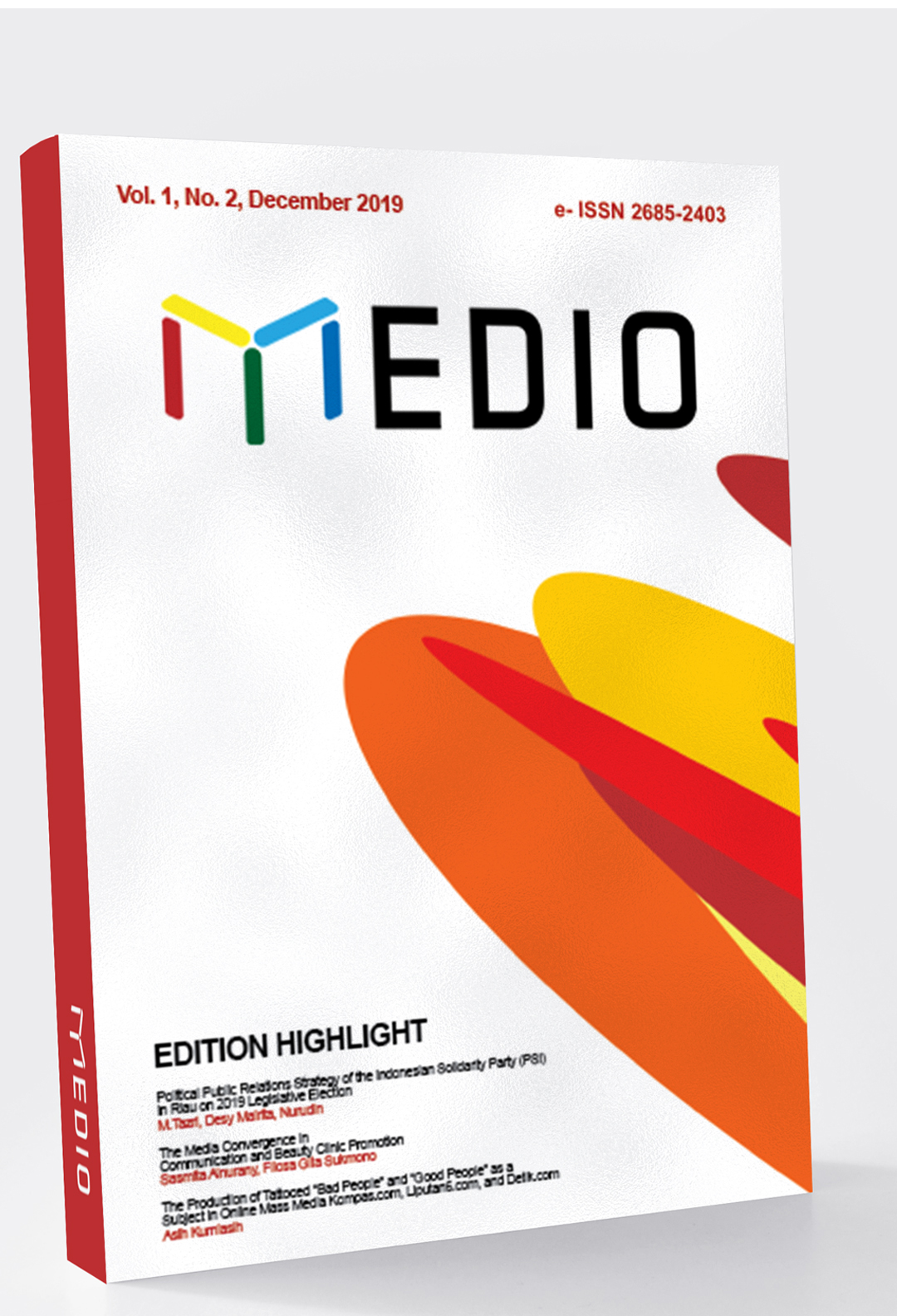Music Component on TVCs: Coca Cola 'Open Happiness' Campaign
DOI:
https://doi.org/10.22219/mdo.v2i1.13167Abstract
Music is part of Coca Cola's life journey. Started in 1971 with the popular TVC “I'd Like to Buy the World a Coke”. Similarly, The “Open Happiness” Campaign was also using music as its strength to grab people's attention. The song which is titled is the same as its campaign, Open Happiness, then became the creative spearhead of Coca Cola's global advertising campaign. The above facts then raises questions which are how music being part of the creative communications strategy in advertising. Semiotics was used as the method to evaluate music as a creative communications strategy on Coca Cola “Open Happiness” TVCs campaign. It also analyzed based on type of music, lyrics and singers. This campaign used the 'dum-dum' beat on hip hop music which creates fun and happy feelings. Then its lyrics asked people to have fun with friends, share happiness with Coca Cola and forget about sadness. Also famous singers which have strong connections with their fans which make it easier for Coca Cola to get into that community. That component is then packed into one song which makes people enjoy it without having any feelings of being persuaded.
Downloads
References
Bellis, Mary (n.d.), ‘The History of Coca Cola: John Pemberton was the inventor of Coca Cola’, viewed 3 April 2011, <http://inventors.about.com/od/cstartinventions/a/cocacola.htm>
Chandler, Daniel 2005, ‘Semiotics for Beginners’, Hypertext, University of Aberystwyth, viewed 3 April 2011, <http://www.aber.ac.uk/media/Documents/S4B/sem01.html>
Leung, Ambrose & Kier, Cheryl A. 2010, ‘Music Preferences and Young People’s Attitudes towards Spending and Saving’, Journal of Youth Studies, vol. 13, no. 6, pp. 681 – 698.
Malcolm, Open Happiness, AZ, blogpost, viewed 15 July 2020, <https://www.azlyrics.com/lyrics/butchwalker/openhappiness.html>
Mazzola, G. 1997, ‘Semiotic Aspects of Musicology: Semiotics of Music’, Thesis Report, University of Zurich, 21 May, viewed 3 April 2011, <http://www.ifi.uzh.ch/mml/musicmediaIdocu ments Imusiksemiotik.pdf>
Murthy, D. Madhavilatha & Gosal, Madhumita 2016, ‘A Study on Aristotle’s Rhetoric Applied to Industrial Communication’, British Journal of English Linguistics, vol. 4, no. 1. pp. 64 – 74.
N.n 2009, ‘Coca Cola Releases ‘Open Happiness’ song in Canada’, Canadian Vending & Coffee Service Magazine, viewed 3 April 2011, <https://www.canadianvending.com/coca-cola-releases-open-happiness-song-in-canada-1978/>
Norton, D.W., Durgee, J.F, & VanDeVelde, J. 2010, ‘Producing Customer Happiness: The Job to Do for Brand Innovation’, Paper presented at Seminar on Design Thinking-Design Management Methods and Processes, viewed 3 April 2011, <http://www.dmi.org/dmi/html/education/seminars/Norton PCH.pdf>
Open Happiness 2009, Open Happiness, online video, 8 April, Youtube, viewed 3 April 2011, <http://www.youtube.com/results?searchguery-open+happiness&ag-f>
Perch, Darbinyan 2019, ‘Coca Cola Target Market’, The Social Grabber, blog post, 19 May, viewed 14 July 2020, <https://thesocialgrabber.com/coca-cola-target-market/>
Ransom, Patricia Fox 2015, ‘Message in the Music: Do Lyrics Influence Well-being?’, Capstone Project, Penn Libraries, University of Pennsylvania, viewed 15 July 2020, <https://repository.upenn.edu/cgi/viewcontent.cgi?article=1094&context=mapp_capstone>
Rutledge, Jack 2009, ‘Music + Ads: Coke’s ‘Open Happiness’’, Adweek, 5 June, viewed 3 April 2011, <https://www.adweek.com/brand-marketing/music-ads-cokes-open-happiness-99509/>
Stelter, Brian 2009, ‘Marketing a Drink, but Never by Name’, The New York Times, 15 July, viewed 14 July 2020, <https://www.nytimes.com/2009/07/16/business/media/16adco.html>
The Coca Cola Company. (n.d.). Growth, leadership, sustainability. Retrieved April 3, 2011 from http://www.thecoca- colacompany.com/ourcompanylindex.html
Umeogu, Bonachristus 2012, ‘Source Credibility: A Philosophical Analysis’, Open Journal of Philosophy, vol. 2, no. 2, pp. 112-115.


